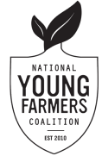Maria Hernandez is a Land Advocacy Fellow with Young Farmers and a first generation immigrant and new farmer based in Douglassville, Pennsylvania.
Hello, my name is Maria Hernandez. I was born in Mexico. As a kid, I lived with my grandmother and swam in the river. I spent my afternoons relaxing in the hammocks and eating from the citrus trees. When I was ten, my family moved to Brooklyn, NY. Living in the city, I missed my family’s paradise and couldn’t wait to get back to the countryside. At the age of 24, we moved to suburban Pennsylvania because I felt I didn’t belong in the city. I always wanted to live somewhere where I could have a backyard and grow my own tomatoes.
We started farming because of health issues. My husband and I wanted our family to be able to eat fresh, organic produce, but the healthier food we wanted to buy was unaffordable. Giving up on our health was not an option, so we decided to learn how to grow our own products. My husband met someone who was looking to rent their land, and we started growing there on our half acre. I started growing little by little–vegetables first, then we added chickens, then we added bees. At some point, we were giving away tomatoes, peppers, and eggs to people in our community, and someone asked me why I wasn’t selling my food, and using that money to grow more, so that I could share it with more people.
We signed up for classes through Penn State Extension to learn how to grow vegetables, then we took another course on beekeeping. That led us to join a group for beekeepers – Berks and Schuylkill Association. Here beekeepers work together in case something happens–if your bees die, for example, everyone will come together and get you more bees. It’s a community. My husband and I also signed up for a class on how to raise chickens, and got involved with Grow NYC, where I took a class on business analysis, and got to visit small farms and meet farmers who showed me how to grow new products with techniques that really helped my operation. For example, through visiting Truelove Seeds, I learned more about the art of seed saving, which can save farmers a lot of money in the long run.
These past few years have been a good learning experience. Now that we have taken some beginner farming classes, and our little farm produces more than it did when we started out, we decided to start selling our flowers, herbs, raw honey, and hormone-free eggs to our local farmer’s market and a refined restaurant. As our farm grows, demand gets higher.
It’s time we grow beyond our half acre. But I’ve been looking for farmland for the past two years and the search has been unsuccessful. Because of my lack of experience buying and renting farmland, my lack of access to financial resources, and the current prices of real estate, it has been impossible for us to expand. And I am not alone: in the National Young Farmers Coalition’s 2022 national survey, 67% of respondents said they stopped farming because finding affordable land to buy was a barrier. 54% identified that finding affordable land to lease was a barrier. Finding secure access to land is an even greater challenge for farmers of color. I have applied and contacted different organizations in hopes that they could help me find land, but being a woman of color and an immigrant, doors are quick to close because I don’t qualify for many programs. Another challenge has always been the language barrier: people hear my accent and no longer hear my words.
We need programs that are easier to navigate, and staff members to call who can walk us through the steps on how to access the resources that already exist for us. The Natural Resource Conservation Service (NRCS) is supposed to be there for you, but where I am, there is no one at NRCS who speaks Spanish. The USDA needs to allocate more resources that will benefit farmers like me, and the 2023 Farm Bill is a historic opportunity to make these investments.
In the 2023 Farm Bill, I want to see funding go directly to community-led land access projects; more staff at USDA who can help coordinate services to beginning farmers, including bilingual technical assistance for Spanish speaking farmers; and more USDA land-related programs that are accessible, appropriate, and accountable to young farmers and farmers of color. Specifically, USDA programs should be accessible to communal land ownership.
As a part of Young Farmers’ One Million Acres for the Future campaign, I am asking my Members of Congress to pass a 2023 Farm Bill that makes this historic investment in equitable land access. We need to actively remove the roadblocks that are keeping young farmers off the land. Secure, equitable access to farmland is an issue that impacts us all, and the future of our food and agriculture systems. All of our voices are important in calling on Congress to create a 2023 Farm Bill that supports young farmers. To get involved with the campaign and receive action alerts, sign up here: p2a.co/land.
There is no reason why people should not be able to afford healthy food grown in their community. My dream is to expand onto five acres of land one day, where we can share our chemical-free produce with more people, at lower prices. The more local farms there are, the lower the prices for fresh food will be for the community. These systemic changes will not just help me and my family, they will help everyone–everyone who farms, and everyone who eats.
